Auditing - Vouching of Debit Side of Cash Book (or) Cash Receipts | 11th Auditing : Chapter 6 and 7 : Vouching of Cash Transactions
Chapter: 11th Auditing : Chapter 6 and 7 : Vouching of Cash Transactions
Vouching of Debit Side of Cash Book (or) Cash Receipts
Vouching of Debit Side of Cash
Book (or) Cash Receipts
Cash book is one of the most important books of accounts.
The auditor has to ensure that all receipts have been accounted for. Errors and
frauds usually arise in connection with cash receipts. Hence, the auditor
should vouch all the cash transactions as far as possible and should ensure
that all receipts have been accounted. He has to ensure that there are no
omissions of cash receipts and the auditor has to rely considerably on the
internal check system in operation. Some of the important cash receipts which
usually appear on the debit side of the cash book and the duty of an auditor in
that connection are given below:
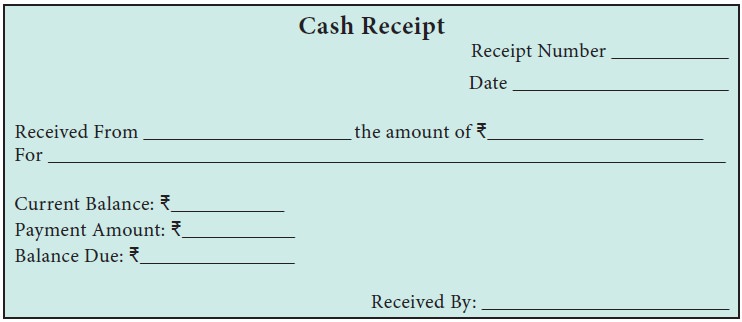
Opening balance
Opening balance of the current year refers to the
closing balance of last year. It should be compared with the balance shown in
the duly audited balance sheet of the previous year. This is done to ensure
that actual balance has been brought down.
Documents to be Vouched: Audited Balance Sheet of last year.
Example:
An auditor should vouch Opening Cash
balance in the following manner:
1. Balance Sheet of last or previous
year, and
2. Cash account for the current year.
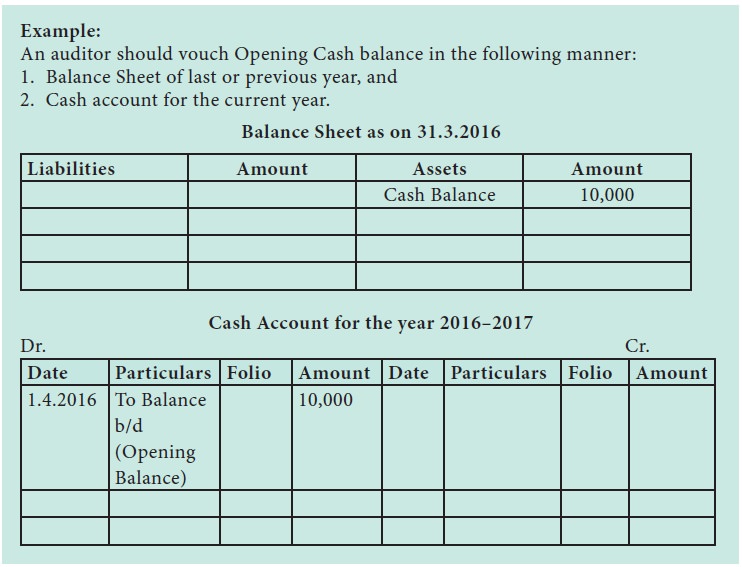
Cash Sales
The auditor should be very careful in verifying
cash sales as there are greater chances of fraud. Firstly, the auditor should
verify the system of internal check in operation with regard to cash sales.
Secondly, he should verify cash sales invoices with the entries in the summary
of daily cash sales with regard to name of the customer, date, quantity, rate,
discount, tax, rounding off etc. Thirdly, the summary of daily cash sales
should be compared and tallied with the sales which are accounted in the cash
book. Fourthly, the auditor should counter check the entries of cash sales in
the cash book with the carbon copies of cash memos. Lastly, the auditor should
ensure that all cash received on account of cash sales is deposited in the bank
on the next day itself. Fraud may take place in respect of cash sales, when
salesmen sell goods and do not make entries in the cash book and misappropriate
the money. In order to overcome such type of fraud, salesmen should be
instructed not to receive cash from customers. The auditor should compare the
dates on the cash memos and the cash book. If cash discount has been allowed on
sales, he should see that a uniform policy and rate of discount has been
followed.
Documents to be Vouched: Sales Invoice, Duplicate cash Memo, Summary
of daily cash sales, Rough cash book and main cash book.
Example:
On 10.4.16, XY Co. sold goods worth
Rs.60,000 for cash.
Vouching of Cash Sales:
Auditor should vouch the genuiness of
the transaction in the following manner:
1. Verify Sales Invoice with regard
to date of sale and sale value.
2. Verify entry in Cash Book with
respect to date and amount.
3. Verify entry in Sales Account with
respect to date and amount.
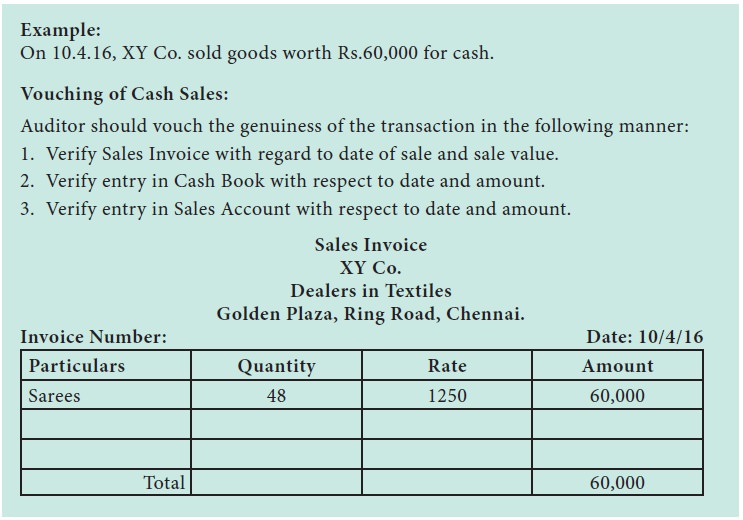
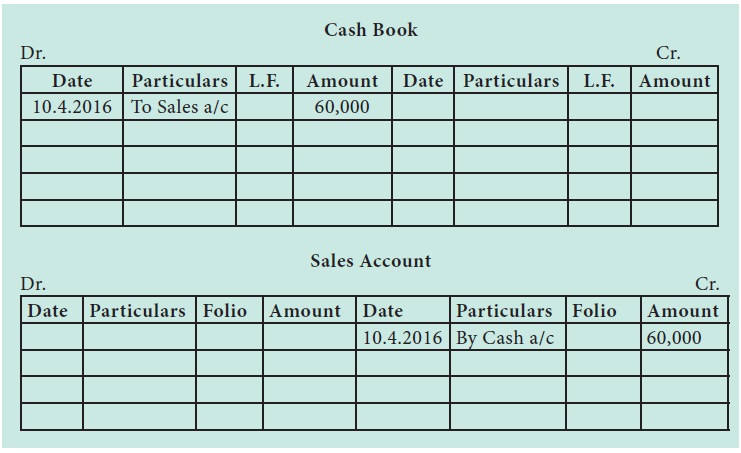
Receipts from Debtors
When cash is received from customers, a cash memo is issued to the customer and a carbon copy of cash memo is retained by the clerk. Fraud can take place by accounting lesser amount than what is actually received. Sometimes, fraud may occur when payment received from a customer is misappropriated without making entry in the account and later on when cash is received from another customer. This practice is called as “Teeming and Lading of Fraud.”
Auditor to overcome such type of fraud, he should
verify the sales invoices and counterfoils of the receipt to ensure the amount
received against the invoice.
Cash received from a customer should be compared
with the entries in the cash book and in the customers account. At frequent
intervals, the auditor should obtain statement of accounts and confirmation of
balances from the debtors and cross check with the entries and balances in the
debtors account. He should also ensure that all cash received on account of
cash sales should be deposited in the bank on the next day.
Documents to be Vouched: Sales invoices, Counterfoils of cash
receipts, Statement of accounts from debtors, Correspondences and confirmations
from the debtors and bank statement.
Example:
On 25.10.2016, Received cash from
Gopal Bros. for Rs.
25,000 towards sale made on 20.10.2016.
Vouching of Cash received from Debtors.
Auditor should vouch the transaction
in the following manner:
1. Verify Cash receipt or memo with
respect to date of receipt, amount and name of customer from whom received.
2. Verify entry in Cash Book with
reference to date, name of debtor or customer and amount.
3. Verify entry in Debtor or
Customers Account with reference to date and amount.
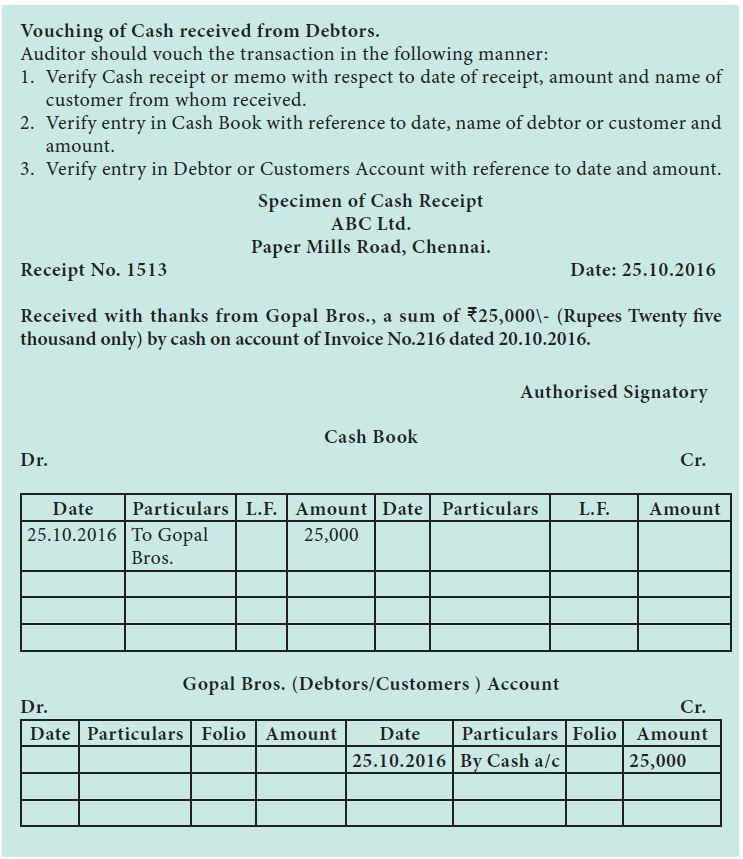
Income from Interest and Dividend
Interest income may arise from loans granted, bills
of exchange accepted by customers, debentures, deposits, bonds and other
investment securities. Vouching of interest received should be from instruments
carrying interest bearing obligation. The auditor should ensure that
accrual/receipt of interest is in accordance with terms of the instrument
concerned, and properly recorded in the books of accounts. For example, interest
received on account of Fixed Deposits in the bank should be vouched with the
Bank Pass book.
He should also verify the accuracy of the interest
calculation. Vouching of interest received on securities should be vouched from
the securities or from the Investment ledger as to the date of the receipt of
interest, amount, rate of interest etc. Interest received for any particular
fund like Provident Fund should be credited to that fund and not to the revenue
account. Further, the auditor should obtain confirmations from the parties
owing interest payment and should check with the entries in the interest
received account and cash book.
Documents to be Vouched: Loan agreement or Fixed deposit receipts,
Counterfoil of cash receipts, Bank pass book.
Vouching of dividends should be done by referring
the relevant dividend warrants, shares, and securities. The auditor should
ensure that the client has indeed received and properly recorded all dividends
that are due to it. When dividend is collected through bank, amount received
should be verified with the bank pass book. He should check the rate of
dividends, amount of gross and net dividends and the tax deducted at source. He
should also check the actual receipts either from the cash book or bank pass
book.
Documents to be Vouched: Dividend warrants, Counterfoils of cash
receipts and Passbook.
Sale Of Investments
Sale of investments should give rise to capital
receipt except in the case of broking or investment firms for whom the proceeds
will be revenue receipts. The amount received on account of the sale of
investments should be vouched with broker’s sold note. When investments are
sold through bank, then bank advice should be verified. At frequent intervals,
the auditor should compare the securities on hand with the amount realised on
sale of securities with investment accounts.
Documents to be Vouched: Bank advice and Broker’s Sold note.
Sale of Fixed Assets
The auditor should examine the minutes book of
directors to ensure that the sale of fixed assets is properly approved by the
Board of Directors in the meeting. He should verify the sale agreement and
correspondences and ascertain the sale value of fixed assets. He should check
the entry in the cash book for sale consideration received and cross check the
entry in the bank statement to confirm that the amount received is deposited in
bank. When investments are sold through broker, auditor should vouch Brokers
sold Note and auctioneers statement should be verified when sold in an auction.
He should verify the calculation of profit or loss on sale of fixed assets and
that the amount is treated as capital profit and is transferred to capital
reserve.
Documents to be Vouched: Sale Deed or Agreement, Minutes book of directors,
Fixed Assets Register, Bank statement, Auctioneer’s sold note or Broker’s sold
note and correspondences.
Example
On 12th December 2016, sold office
furniture for Rs. 11,000 for cash which costs Rs. 96,000.
Vouching of Sale of Fixed Assets.
Auditor should vouch the transaction
in the following manner:
1. Verify entry in Cash Book with
reference to date, amount and nature of asset sold.
2. Verify entry in Asset Account with
respect to date and sale amount.
3. Verify entry in Fixed Assets
Register with respect to date, invoice number, cost, rate of depreciation and
specification or description of asset sold.
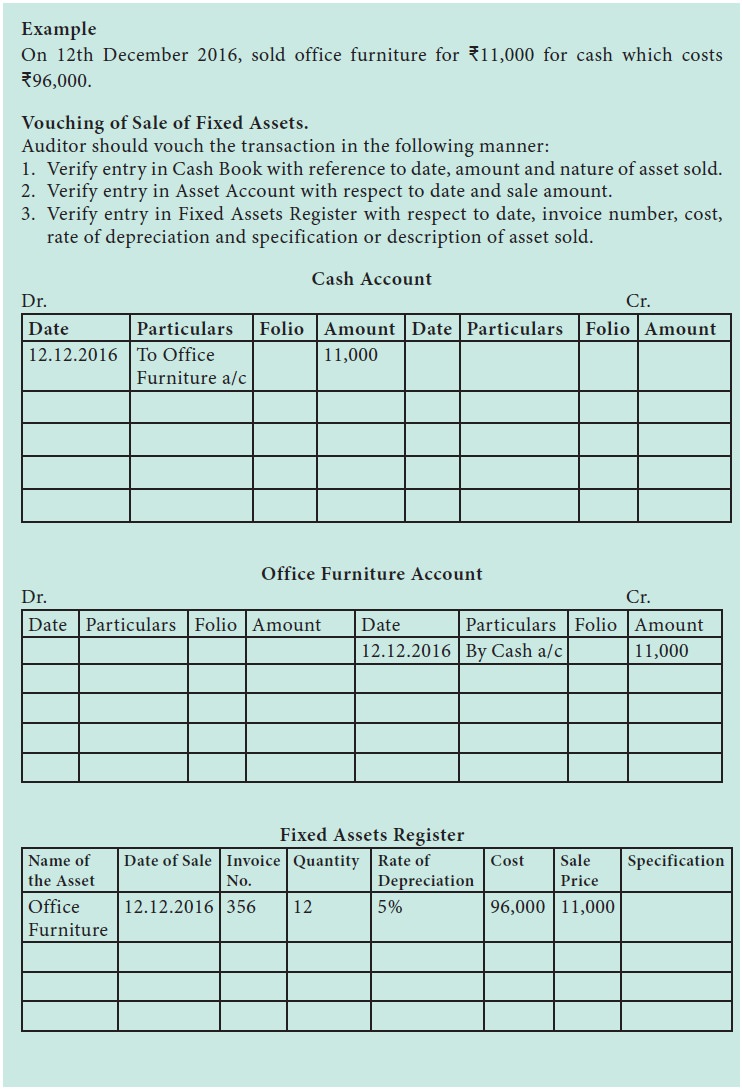
Related Topics